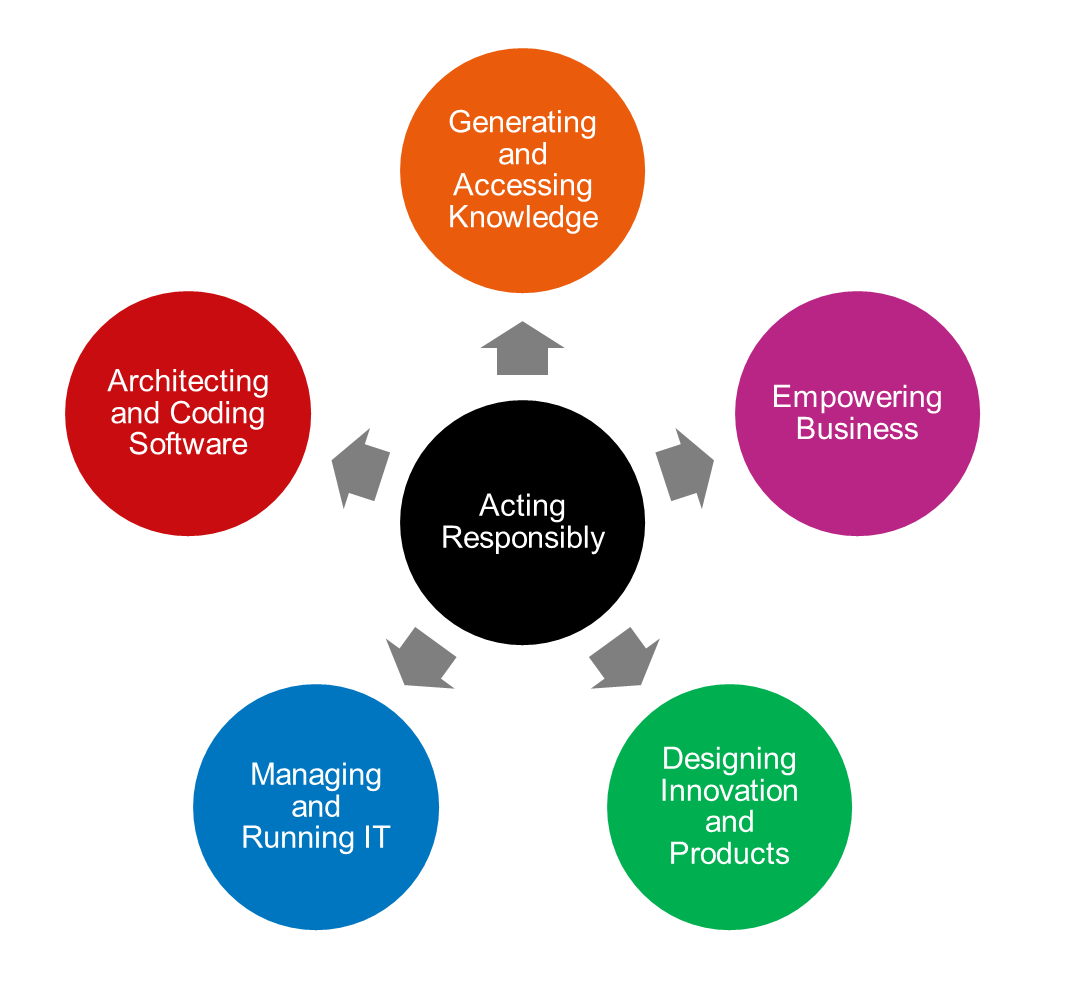
Professional action in the field of digital systems requires a wide range of personal and social skills. These include more classic skills such as project and time management, creativity techniques, teamwork and creation and presentation of scientific papers and texts.
The field of the digital with its multi-layered interrelationships furthermore requires a high degree of reflection and problem-solving skills and the ability to work in interdisciplinary, intercultural and English-speaking contexts.
Acting Responsibly, however, has not only a personal but also a societal aspect, i.e. acting responsibly in a societal context. This includes e.g. an ethical reflection of one’s own actions, effects of impact of digital technologies on socio-technical contexts, etc.
The focus area “Architecting and Coding Software” deals with methods and tools for designing software and software-based digital systems and technologies. Special emphasis is placed on the architecture of large and potentially highly distributed IT landscapes, best practices in coding and hosting complex applications and methods for understanding the requirements of a wide variety of domains.
In the field of software development, graduates model and abstract the functional aspects of application systems. They decompose problems into subproblems, which are solved in dedicated software components through an implementation.
Further activities of the graduates in this focus area will be for example:
Digitization, or digital transformation, involves changing, simplifying, automating or even creating new processes, products and customer experiences with information technology. Digitization drives change in society and the economy. In addition to evolutionary further development, disruptive leaps are taking place. New innovative processes, products and services are created that are driven by digitization and enabled by new technologies.
People working in this field not only realize information-processing systems, but also design them reflectively, with self-imposed goals and with thoughts of later users. They implant their results in social, economic and cultural contexts. Furthermore, they search for, discuss and cause interferences of possible products with these contexts, e.g. in the dimensions of human-machine-interaction and society-technology-interaction.
The activities in the field of “Designing Innovations and Products” are characterized by interdisciplinary, explorative and creative thinking with a focus on business and operating models for innovative products and services.
The Empowering Business focus area is characterized by the development of business capabilities using digital services. The analysis, optimization, and redesign of flexible and adaptable socio-technical systems must be aligned in such a way that stable business development is supported in the long term. This includes, for example, the promotion of customer relationships, the relief of company employees and the digital support of inter-company networks as well as internal processes.
The instruments to be used for this purpose include the digitalization of processes, process optimization, including automation, and flexibilization. Furthermore, new business models must be made possible through the use of digital applications and future-oriented technologies, such as AI.
The Generating and Accessing Knowledge focus area covers the entire digital generation process from data to information to knowledge. The focus is on data acquisition, processing and analysis (e.g., with mathematical-statistical methods), information structuring and knowledge organization. In addition to technical and computer science-related aspects, an information science perspective is increasingly cast on the challenges, approaches and solutions. In concrete terms, these methods and techniques are applied, for example, in the area of knowledge discovery, where a wide range of topics from research data (management) to techniques of artificial intelligence and machine learning are used.
The Managing and Running IT focus area aims to provide comprehensive expert knowledge for setting up, operating and further developing IT, taking into account effectiveness, efficiency and security, as well as for supporting digital transformation. This includes designing IT to meet requirements and exploring new IT deployment scenarios and technologies, as well as management and budget responsibility.
Furthermore, in the context of the digital transformation of organizations and their business processes, participation in the further development of the IT strategy, the setting of essential design impulses in the company and the ability to represent these at management level and in teams are essential aspects. Implementability, acceptance, marketability, and value contribution are always in focus, as is minimizing the risks associated with the use of IT.